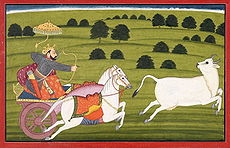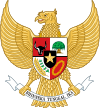- Prithvi
-
For other uses, see Prithvi (disambiguation).
 Prithu chasing Prithvi, who is in the form of a cow.
Prithu chasing Prithvi, who is in the form of a cow.
Prithvi (Sanskrit: पृथ्वी pṛthvī, also पृथिवी pṛthivī) is the sanskrit name for earth and its essence Prithivi Tattwa, in the form of a mother goddess or godmother. Prithvi is also called Dhra, Dharti, Dhrithri, meaning that which holds everything. As Prithvi Devi, she is one of two wives of Lord Vishnu. His other wife is Lakshmi. Prithvi is another form of Laxmi. Another name for Her is Bhumi or Bhudevi or Bhuma Devi.
As Prithvi Mata "Mother Earth" she contrasts with Dyaus Pita "father sky". In the Rigveda, Earth and Sky are frequently addressed in the dual, probably indicating the idea of two complementary half-shells. She is the wife of Dyaus Pita ('father Dyaus'). (The widespread belief that these two were originally a single deity appears to be mistaken. See Dyavaprthivi). She is the mother of Indra and Agni. According to a tradition, when Indra killed Dyaus Pita, she applauded and married him. She is associated with the cow. Prithu, an incarnation of Vishnu, milked her in the cow's form to get food from her. She is a national personification in Indonesia, where she is known as Ibu Pertiwi ('Mother Earth').
Contents
Ephitets
Indonesian depiction of Prithvi in ancient regal attire as Mother Earth at Indonesian National Monument
As Provider
- Bhumi ("Soil")
- Dhatri ("Nursing Mother")
- Dharitri ("Nurturer")
- Janitra ("Birthplace")
- Medini ("Nurturer")
- Prshni ("Mother of Plants")
- Vanaspatinam Grbhir Osadhinam ("Womb of Forest Trees and Herbs")
- Vishvadhaya ("All-Nourishing")
- Vishvagabha ("World's Womb")
- Vishvamshu ("Producer of Everything")
- Vishvasvam ("Source of Everything")
As Sustainer
- Dhara ("Upholder")
- Drdha ("Steady One")
- Ksama ("Patient One")
- Sthavara ("Stable One")
- Vishdava ("All-Preserving")
- Vishvadharini ("All-Supporting")
- Vishvamhara ("All-Bearing")
As Enricher
- Ratnagarbha ("Repository of Gems"")
- Ratnavati ("Abounding in Jewels")
- Vasundhara ("Bearer of Treasure")
Buddhism
Prithvi also appears in Early Buddhism where she appears in the Pali Canon, dispelling the temptation figure Mara by attesting to Gautama Buddha's worthiness to attain enlightenment.[1]
In the Arts
Pṛithvī Sūkta (also Bhūmī Sūkta) is a celebrated hymn of the Atharvaveda (AVŚ 12.1), dedicated to Prthivi (the Earth). It consists of 63 verses.
In art she is represented as a woman with four arms and a green skin.
References
- ^ Shaw, Miranda Eberle (2006). Buddhist Goddesses of India. Princeton University Press. pp. 237. ISBN 9780691127583. http://books.google.co.uk/books?id=MvDKOK1h3zMC&.
Further reading
- Dictionary of Hindu Lore and Legend (ISBN 0-500-51088-1) by Anna Dallapiccola
- Hindu Goddesses: Vision of the Divine Feminine in the Hindu Religious Traditions (ISBN 81-208-0379-5) by David Kinsley
Hindu deities and texts Gods 
Goddesses Texts List of Indonesia-related topics History Timeline · Pre-colonial Indonesia (pre-1602) · Dutch East Indies (1602–1945) · Post-independence (1945–1965) · New Order (1965–1998) · Reformation (1998 to date)
Geography and
natural historyGovernment
and politicsPancasila · Constitution · President (list) · Cabinet · People's Consultative Assembly · Foreign relations · Political parties · Elections · Military · Law · Law enforcement · Human rights · LGBT rightsEconomy Companies · Communications · International rankings · Science and technology · Stock Exchange · Tourism · TransportCulture Architecture · Art · Cinema · Cuisine · Dance · Education · Figures · Heroes · Legends · Literature · Martial arts · Media · Music · Public holidays · SportDemographics National symbols Categories:- Classical elements
- Earth goddesses
- Hindu goddesses
- Mother goddesses
- National symbols of Indonesia
- Rigvedic deities
- Hindu mythology stubs
Wikimedia Foundation. 2010.

